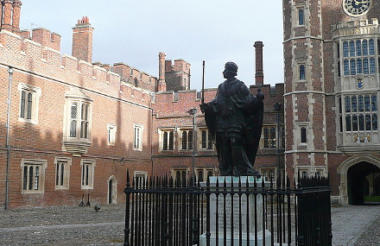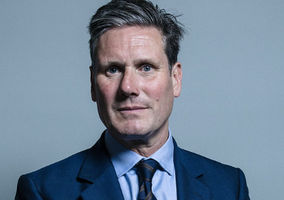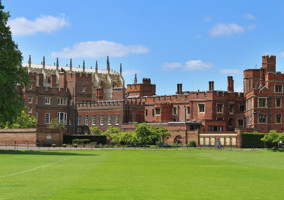Keir Starmer recently took the opportunity on prime minister's questions to challenge Rishi Sunak over “tax breaks” for private schools, though has also said there is “no case” for abolishing private schools as they “add a huge amount to our country”.
Charity sector leaders have made clear that there are differences between ridding some tax concessions for private schools, removing charitable status, and abolishing them altogether.
It is no secret that Britain’s most influential people are more likely to have been to a fee-paying school than the general population. In fact, just 7% of British people are privately educated, compared to 39% of those in top positions, according to findings presented in Elitist Britain. The same applies to civil society, where one in six charity CEOs are privately educated.
Indeed, plans to axe the charitable status of these fee-paying schools or remove some tax concessions are not new policies, with many of Starmer’s predecessors arguing the case. It is also a suggestion that levelling up secretary Michael Gove made in 2017, and the Conservatives election manifesto that year raised the prospect of charging private schools VAT if they did not do more to help the state sector.
Labour’s stance is dubbed by some as gesture politics or a tax on aspiration, and by others a no-brainer and essential step towards social equality. But as is often the case, it looks like things may be a bit more fiddly than at first glance – regardless of where one falls on this spectrum.
Public benefit
Many private schools in the UK have charitable status, which means they are able to take advantage of various tax concessions, including the ability to reclaim some VAT in certain circumstances. These institutions have to generate a meaningful amount of public benefit, though the Charity Commission is not prescriptive about this.
The regulator previously tried to impose a number of requirements on schools around how they demonstrate public benefit, though this was challenged by independent schools and in 2011 the high court decided that the Commission was being too exacting. It should be up to individual schools how they generate public benefit, found the court.
Tax changes and charitable status
Sector bodies have also been clear they would like more details on any proposals, in order to consider the implications.
On not charging VAT on fees, Starmer has said: “I don’t think [it] can be justified and if we were to change that, that money could be used to provide provision into state schools that desperately need it.”
A key issue is around charitable status as opposed to tax status. Indeed, Richard Sagar, head of policy at Charity Finance Group, previously told Civil Society News that removing some tax benefits and retaining charitable status, which some commentators have proposed and which the Barclay review in Scotland recommended as the best approach, would create a two-tier system of charities and risk creating confusion amongst the public.
He suggested that removing charitable status from private schools would avoid this difficulty.
Similarly, Richard Bray, chair of Charity Tax Group said all charity tax reliefs should apply equally to all organisations which are recognised as being charities. He noted that if Labour were to remove charitable status from public schools, this would no longer be a tax issue.
Potential legal challenges
In an article considering why Labour’s proposals to end charitable status for independent schools could face legal challenges, Robert Meakin at Keystone law, suggests this may happen under Article 2 of the Protocol to the European Convention on Human Rights: Right to Education. This protects the right of parents to educate their children: “in conformity with their own religious and philosophical convictions”.
“Beyond independent faith schools, it could also be argued that the desire to educate one’s children at an independent school was a philosophical conviction which would be denied if the removal of charitable status led to a school’s closure and there were no other options available in the area,” he wrote.
John Tizard also wrote about the importance of avoiding unintended consequences.
“For example, it would be essential to ensure that schools run by charities for disabled children or community nurseries are not swept aside by policies designed to address the likes of Eton,” he wrote.
Would it help the public purse?
The other potential considerations for the sector may be around whether these changes could help put money into state education, and also if they would make any meaningful difference for social equity. Many charities have social mobility and equality as key to their causes, and want to see a more fair society, so may conclude private schools should lose their charitable status or be abolished.
Independent Schools Council, which represents 1,300 schools, state they are giving away £480m this year in means-tested help with fees. Private schools also contribute an annual £16.5bn to the economy, its research claims.
Labour has said private schools paying VAT could raise £1.7bn for the Treasury which would be spent on improving state education.
Ultimately, many in the sector will feel there is little justification for tax concessions or charitable status, and whether or not these policies will bring more money into the state may not be the focal issue – it is about tackling unfair class privileges.
Should private schools have their charitable status removed?
Should private schools lose their charitable status?
— Civil Society (@CivilSocietyUK) December 6, 2022
Editor's Note: A line has been amended in this piece to clarify many private schools in the UK have charitable status, which means they are able to take advantage of various tax concessions, including the ability to reclaim some VAT in certain circumstances.
Related Articles
John Tizard: Private schools’ charitable status is neither in public interest nor that of other charities
John Tizard sets out the case for stripping private schools of charity status.
Kirsty Weakley: Is it possible to resolve the charity sector’s private school dilemma?
As the Labour Party promises to abolish private schools and seize their assets, Kirsty Weakley looks at the dilemma this poses for the charity sector.












